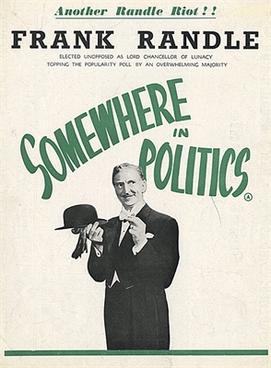Somewhere in Politics: Difference between revisions
m (1 revision imported) |
No edit summary |
||
| Line 1: | Line 1: | ||
{{italic title}} | {{italic title}} | ||
{{Infobox film | {{Infobox film | ||
| image = "Somewhere_in_Politics"_(1948).jpg | | image = "Somewhere_in_Politics"_(1948).jpg | ||
| image_size = | | image_size = | ||
| Line 72: | Line 69: | ||
[[Category:1940s English-language films]] | [[Category:1940s English-language films]] | ||
[[Category:1940s British films]] | [[Category:1940s British films]] | ||
Latest revision as of 16:40, 20 February 2023
| Somewhere in Politics | |
|---|---|
 | |
| Directed by | John E. Blakeley |
| Written by | Harry Jackson |
| Produced by | John E. Blakeley |
| Starring | Frank Randle Tessie O'Shea Josef Locke |
| Cinematography | Ernest Palmer Ben R. Hart |
| Edited by | Dorothy Stimson |
| Music by | Fred Harries |
Production company | |
| Distributed by | Mancunian Films (U.K.) |
Release date |
|
Running time | 108 minutes |
| Country | United Kingdom |
| Language | English |
Somewhere in Politics is a 1949 British comedy film directed by John E. Blakeley and starring Frank Randle, Tessie O'Shea and Josef Locke.[1] It was the fifth film in the Somewhere series of films featuring Randle followed by It's a Grand Life (1953).
According to the British Film Institute (BFI), only a print of an "18-minute short from the film, entitled Full House", is known to exist.[2]
Plot
Joe Smart (Frank Randle) is a radio repairman who enters the political arena competing in an upcoming election against his own boss. Joe wins the election, but encounters loads of trouble in the process.
Cast
- Frank Randle - Joe Smart
- Tessie O'Shea - Daisy Smart
- Josef Locke - Cllr. Willoughby
- Sally Barnes - Marjorie Willoughby
- Syd Harrison - Tony Parker
- Max Harrison - Arthur Parker
- Bunty Meadows - Martha Parker
- Jimmy Clitheroe - Sonny
- Sonny Burke - Reggie Smart
- Anthony Oakley - Howard
- Bernard Graham - Bank Manager
- Effi McIntosh - Mrs. Jones
- Kay Compston - Lady Hazelmere
- Fred Simister - Detective Sergeant
- George Little - Mayor
Critical reception
In contemporary reviews, The Monthly Film Bulletin wrote: "The provinces will probably enjoy this knockabout comedy, though many Londoners will fail to see the point". To-Day's Cinema concluded: "In addition to the untiring inventiveness of the star in grimace and tumble, the escapades are served by the clowning of Tessie as Randle's electioneering wife - she also heaves her 'two-ton' around in abandoned dance - by the singing of sentimental ditty by Josef Locke, and by the lunacies of Syd and Max in song and sally. It is all put over with pace and vigour, and will doubtless register heartily with the legion of Randle fans."[2]
References
- ^ "Somewhere in Politics". British Film Institute. Archived from the original on 2009-01-17.
- ^ a b "Somewhere in Politics (aka A Full House)". British Film Institute. Archived from the original on 3 August 2012. Retrieved 25 May 2014.
Bibliography
- Richards, Jeffrey. Films and British national identity: from Dickens to Dad's Army. Manchester University Press, 1997.
External links
- Somewhere in Politics at IMDb
- BFI Most Wanted entry, with extensive notes
- Articles with short description
- Template film date with 1 release date
- Pages using infobox film with unknown parameters
- IMDb title ID not in Wikidata
- 1949 films
- 1948 comedy films
- 1948 films
- Films directed by John E. Blakeley
- British comedy films
- Lost British films
- British black-and-white films
- 1949 comedy films
- Films shot in Greater Manchester
- 1940s English-language films
- 1940s British films